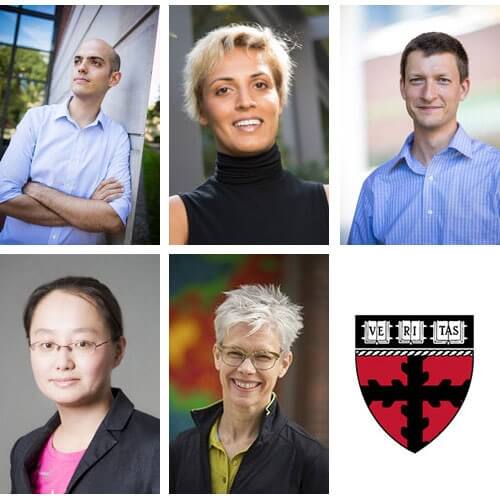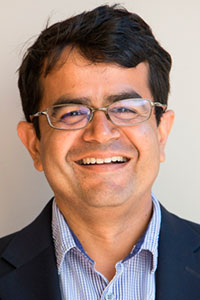News
First row from left: Flavio Calmon, Assistant Professor of Electrical Engineering; Prineha Narang, Assistant Professor of Computational Materials Science; and Boris Kozinsky, Associate Professor of Computational Materials Science
Second row from left: Minlan Yu, Associate Professor of Computer Science; and Susan A. Murphy, Professor of Statistics and of Computer Science
A new academic year brings a new group of distinguished researchers to the halls of the Harvard John A. Paulson School of Engineering and Applied Sciences (SEAS). This year, six new faculty will begin work at SEAS, bringing expertise from a range of fields including electrical engineering, materials science, bioengineering, and computer science.
The new faculty are:
Flavio Calmon, Assistant Professor of Electrical Engineering, comes to SEAS from the IBM T.J. Watson Research Center, where he was a Data Science for Social Good Postdoctoral Fellow, and from MIT, where he obtained a Ph.D. in Electrical Engineering and Computer Science. Calmon's research intersects information theory, machine learning and statistics, focusing on applications in data science and content distribution. He aims to understand the fundamental limits of what can be learned from noisy data, and to design practical estimation algorithms that approach these limits. He also investigates how information theory and machine learning can be applied for the social good to topics such as privacy and fairness. His research seeks to develop tools that will guide the design of the next generation of systems that acquire, process and distribute information while providing reliability, efficiency, fairness and privacy guarantees.
Prineha Narang, Assistant Professor of Computational Materials Science, came to Harvard to explore the new field of excited state quantum materials and devices as a Ziff Environmental Fellow at the Harvard University Center for the Environment. She was also a Research Scholar in Condensed Matter Theory in the MIT Department of Physics, working on new theoretical methods to describe electron-phonon coupling in materials. Narang received her Sc.B. in Materials Science from Drexel University and an M.S. and Ph.D. in Applied Physics from Caltech, as a National Science Foundation Graduate Fellow and Resnick Sustainability Institute Fellow. Her graduate work focused on understanding light-matter interactions in areas ranging from quantum plasmonics to nitride optoelectronics. Narang's current research interests include excited-state and ultrafast optoelectronic materials, atomic-scale engineering, imaging and sensing technologies. Outside of science, she is an avid triathlete and runner.
Boris Kozinsky, Associate Professor of Computational Materials Science, comes to SEAS from the Robert Bosch Research and Technology Center where he served as a principle scientist. Kozinsky works at the intersection of fundamental physics of materials properties, efficient computational algorithms, and data-intensive informatics approaches. The overall vision of his research is to leverage the rapidly expanding power of computation and data science to accelerate discovery and design of new practical materials needed for breakthroughs in energy storage and conversion systems. Kozinsky studied at MIT for his B.S. degrees in Physics, Mathematics, and Electrical Engineering and Computer Science, and received his PhD degree in Physics also from MIT in 2007. He has authored over 50 patents in the fields of batteries, thermoelectrics, piezoelectrics and catalysis. He will start at SEAS in January 2018.
Minlan Yu, Associate Professor of Computer Science, comes to SEAS from Yale University, where she served as an associate professor in the computer science department. Her research focuses on designing networked systems that make data centers inherently easier to manage. Data centers are immensely beneficial for business and society (e.g., social media, public health, and entertainment), but they are also immensely difficult for network operators to manage.
To meet these management needs, Yu's work redesigns data center infrastructure to make it fundamentally easier to manage with less human involvement. She combines network domain knowledge with programming languages to provide new declarative abstractions for network management. She also designs creative algorithms and data structures that enable real-time management decisions with minimal resources. Her systems have been deployed in the world’s largest data centers and have influenced switch chip designs. She received her B.A. in computer science and mathematics from Peking University in 2006 and her M.A. and Ph.D in computer science from Princeton University in 2008 and 2011. She will start at SEAS in January 2018.
Susan A. Murphy, Professor of Statistics and of Computer Science, comes to Harvard from the University of Michigan, where she served as the H.E. Robbins Distinguished University Professor of Statistics. Her lab develops experimental trial designs and data analysis methods for increasing the usefulness of mobile health interventions. Murphy works in the areas of substance abuse (how to support recovering alcoholics, how to help kids stay away from drugs), physical activity, how to help people quit smoking and stay quit and how to help people stay on track to achieve their longer-term goals. Heart attack survivors, for example, may be looking for ways to stay more active. Murphy and her team are working to design collection and use of data that helps pinpoint settings to improve activity — including location, time of day and weather — and discover types of support the smartphone might offer that would be most effective in encouraging activity, including sending useful activity ideas, messages to show progress, help in planning future activity, and so on. She received her B.S. in Mathematics from the Louisiana State University, Baton Rouge and her Ph.D. in Statistics from the University of North Carolina, Chapel Hill.
As previously announced, also new to the SEAS faculty this year is Samir Mitragotri, Hiller Professor of Bioengineering and Hansjorg Wyss Professor of Biologically Inspired Engineering. He is a leading chemical- and bio-engineer who develops new techniques and materials for treating conditions such as diabetes, cancer and bleeding disorders.
Topics: Academics
Cutting-edge science delivered direct to your inbox.
Join the Harvard SEAS mailing list.
Scientist Profiles
Samir Mitragotri
Hiller Professor of Bioengineering and Hansjorg Wyss Professor of Biologically Inspired Engineering
Press Contact
Leah Burrows | 617-496-1351 | lburrows@seas.harvard.edu




